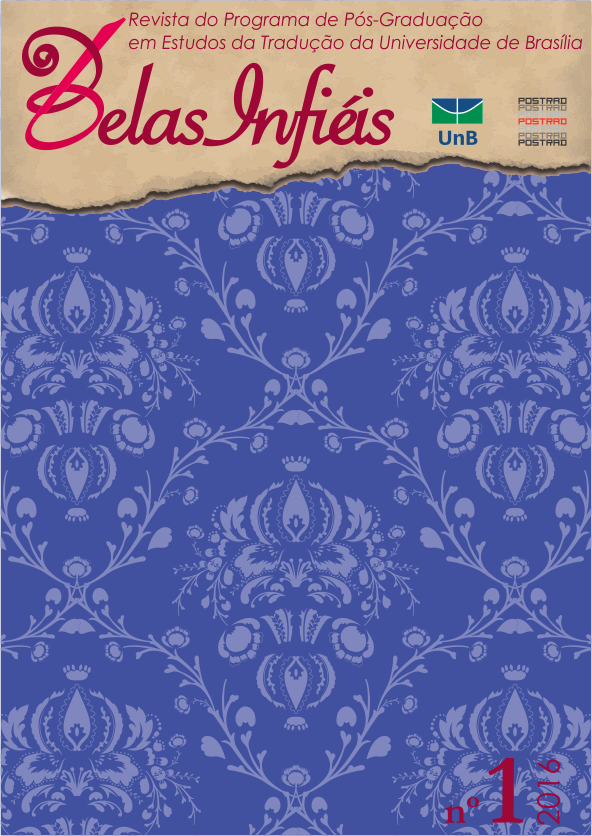EL ALIENISTA:
A VERSÃO/TRADUÇÃO PARA O ESPANHOL DE REMI GORGA FILHO DO O ALIENISTA, DE MACHADO DE ASSIS
DOI:
https://doi.org/10.26512/belasinfieis.v5.n1.2016.11378Palabras clave:
Machado de Assis, Tradução literária, Remi GorgaResumen
O foco do presente trabalho é analisar a tradução/versão que o tradutor brasileiro, residente no Equador, Remi Gorga Filho fez do conto O Alienista, de Machado de Assis, para o espanhol. E se a ironia, a leveza e as sutilezas da prosa do Machado de Assis passam à versão. A tradução será analisada seguindo a proposta do método de crítica produtiva de Antoine Berman (1995). O trabalho tenta definir se o tradutor fez uma versão acessível para um público que está sendo conquistado para a leitura. A tradução de Gorga do O Alienista foi publicada no Equador, no marco de uma campanha massiva de leitura que colocava os livros à venda ao preço de um dólar.
Descargas
Citas
BERMAN, Antoine. Pour une critique des traductions :Jonh Donne. Paris: Gallimard, 1995.
BLOOM, Harold. Genius: a mosaic o one hundred exemplary creative minds. New York: Warner Books, 2003.
ESPINOSA DOMÃNGUEZ, Carlos. Andanzas póstumas: Machadode Assis en español.In: Revista Caracol Vol I. São Paulo: USP, 2010. Disponível em: http://www.revistas.usp.br/caracol/issue/view/4716. Acessado em 27 de dezembro de 2015.
MACHADO DE ASSIS, Joaquim Maria. El Alienista. Tradução de Remy Gorga Filho. Quito: Luna de Bolsillo, 2011.
_____________ O Alienista. In: Papéis Avulsos. São Paulo: Penguin Classics Companhia das Letras, 2011.
SONTAG, Susan. “Afterlives: the case of Machado de Assis” In: The New Yorker, 7 de maio, 1990. P. 102.
TORRES, Marie-Hélène Catherine. Traduzir o Brasil literário: Paratexto e discurso deacompanhamento. Tradução de Marlova Aseff eEleonora Castelli. Santa Catarina:Copiart, 2011.
Descargas
Publicado
Cómo citar
Número
Sección
Licencia
Copyright Statement
Given the public access to this journal, the texts are free to use but requires the recognition of the original authorship and initial publication in this journal to be properly stated.
The journal allows the use of works published for non-commercial purposes, including the right to submit the work to publicly accessible databases. Published contributions are the sole and exclusive responsibility of the author(s).
- When submitting papers to be evaluated by the Belas Infiéis journal, the author(s):
- Declare that the contents of the contributions are original and of their original creation, being entirely responsible for their content if there is an objection by third parties.
- Claim to be aware that they should not commit academic plagiarism.
- Declare that the manuscript has not been published, completely or partially, in Portuguese or another language. If it is a translation it should be submitted to the Translated Articles section.
- Declare that the manuscript is not being evaluated by other journals.
- Declare that the manuscript was not submitted to another journal simultaneously.
- Commit(s) to inform the journal of any kind of error or inaccuracy in their contribution (published, in evaluation or in editing) and to collaborate with the editors to make due corrections of the article (when in evaluation or editing) or erratum/retraction (after publication).
- Declare that there is no conflict of interest regarding the published work.
- Authorize its release if it is accepted for publication without any kind of monetary compensation.
- Agree to assign non-exclusive rights to publication to the magazine, remaining free to make their contribution available in other media as long as the publication of the first version in Belas Infiéis magazine is mentioned. They also authorize Belas Infiéis to assign their texts for reproduction in content indexers, virtual libraries and similar platforms.
- Maintain copyright and grant the journal the right of first publication, the work being licensed under theCreative Commons Attribution License.
- Is/Are allowed and encouraged to publish and distribute their work online after the editorial process, which may increase the impact and citation of the published work.
- Authorize the editorial team to make textual adjustments and to adapt the article to the publication rules, when necessary.



















